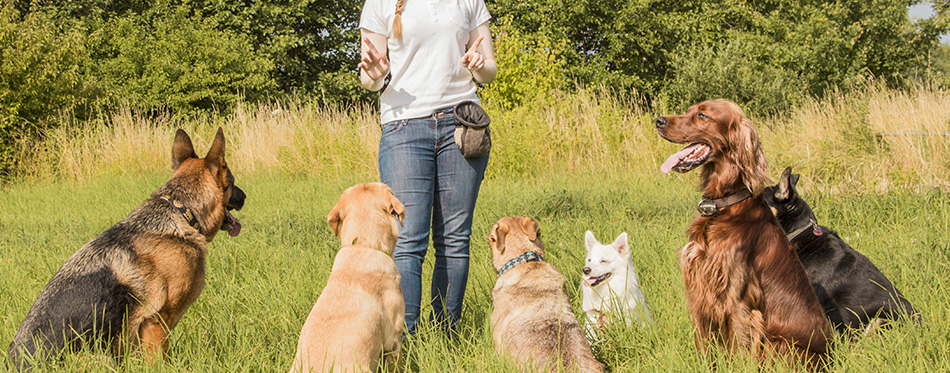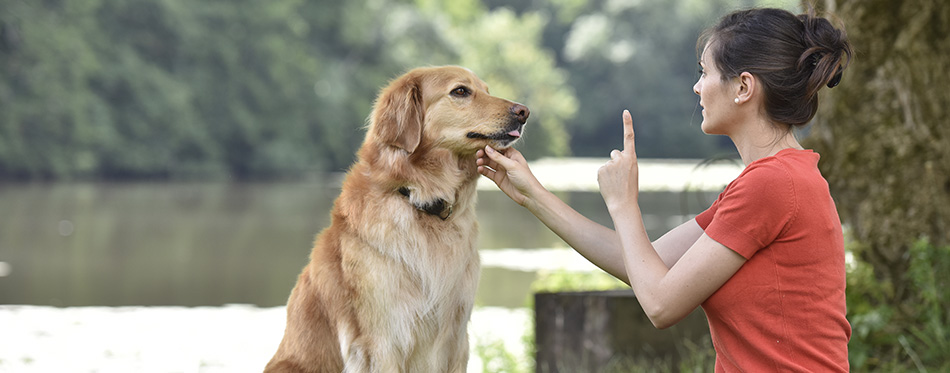Know of the idiom “You can’t teach an old dog new tricks”? Well, it couldn’t be more wrong! Our older canines can indeed pick up new things, even if they’re that little bit older. Although they may not take to adult dog training with the ease of a puppy,
To that end, you shouldn’t be asking can you train an old dog. Rather, you should be asking how to train an older dog! And we’ve written just the article to help you out, littered with training methods and advice for owners with senior dogs everywhere.

Is it Possible to Train Older Dogs?
It is indeed possible to train older dogs. Yet although entirely possible, there are many factors to consider with training an older dog that don’t need to be deliberated when training a puppy:
Treat calories must be factored in
Puppies are such energetic creatures that they burn off treats from training in a matter of hours. Older dogs, on the other hand, don’t enjoy such fast metabolisms! Owners training senior dogs therefore must jot down the number of treat bags that they’re awarding their dog with in training sessions in order to keep them trim. And yes; although your older canine may protest, this does mean cutting down the amount they’re allowed for dinner!
Cater for any physical ailments
Unlike senior dogs, young puppies haven’t been around for long enough to develop many joint conditions. Encouraging young dogs to fetch and retrieve balls is a popular training method. And although puppies love it, older dogs may not be capable of running riot like their younger friends due to health conditions such as arthritis or hip dysplasia. For that reason, be sure to cater for any physical conditions your senior dog may suffer from.
Don’t be tempted to overrun training sessions
Given the strong bond that older dogs have with their family members, it’s important not to continue a training session for a long period of time – even if they’re picking up new tricks at a fast pace. Setting a timer and creating a calendar for your training sessions so that they’re kept short and frequent rather than long and infrequent is the best way for your old dog to pick up the basics.
At What Age is Too Late to Train a Dog?
There exists no age that it’s too late to train a dog! In fact, trainers state that training an older dog is, in many ways, far easier than training a puppy. Firstly, it’s incredibly rare for an adult dog not to know basic commands like “sit” and “lie down”, so the training basics are already covered.
Plus, no matter what kind of background your dog grew up in, they’ll have picked up certain words just from being around other humans. They also won’t have any difficulty understanding the basic concept of positive reinforcement and know that when a bag of yummy treats has been brought out, that means they’ll be rewarded for doing the right thing.
Importance of Training Your Senior Dog
Dog owners deliberate the question “can older dogs be trained” to such an extent; yet the question that they should be focusing on is “why older dogs aren’t trained more often”. Training is, in fact, incredibly important for ensuring your senior dog has the best shot at their senior years as possible. Read on below to discover the benefits of setting aside time to give your dog training.
It helps their cognitive functioning: If dogs’ brains are constantly kept active as they age, the chances that their brain degenerates are slimmer. CDS – the term that pet behavioral specialists attribute to the severe mental decline that canines experience in their senior years – is believed by experts to originate in the brains of those dogs who aren’t stimulated often. If older dogs are therefore engaged in training, their minds will be kept as sharp as tacks.
Training is wonderful for strengthening the relationship between man and dog: Even if your older dog doesn’t necessarily need you to be their dog trainer, why not set aside time for training sessions anyway? An older family dog will truly cherish training time with one of their favorite family members – after all, they deserve loads of attention after putting up with you all for this long!
Exercise is so good for any pet: As dogs age, they’re less inclined to beg their owners for a walk than happily lie down in their favorite corner for a snooze. Yet as scientists profess, we should be keeping dogs of every age active through training! In fact, studies have proven that keeping an old dog active helps grow brain cells, as research spanning numerous species concludes that skeletal muscle cells secrete proteins into the blood during exercise that have a regenerative effect on the brain itself.
How to Train an Adult Dog to Listen?
Training your dog is one thing, but actually succeeding in encouraging them to listen is another! We’ve listed several dog training tips below to help you capture your dog’s attention.
Practice patience: A old dog won’t respond well to training if they pick up on the fact that you’re frustrated at them for not picking up new tricks at a faster speed. Any dog will learn much faster if their owners are patient and encouraging, offering them praise whenever it’s earned.
Repetition is key: A older dog learns to listen by understanding what to listen for. And they won’t know if you don’t constantly repeat the same set of instructions! Say, for example, you alter the wording of an instruction such as “lie down” to “sprawl”. This lack of consistency will only confuse your poor pup.
Return to the same calm setting to carry out dog training: Teaching your dog the skill of listening cannot be carried out in an environment filled with distractions. Teaching their obedience class at home is the best place to hone their listening skills. Once your dog is ready to flaunt their new listening skills, showing them off in front of the family is a really special way to celebrate their progress.
Take a weekly training course: Have you ever considered that your older dog may not be listening because you haven’t given them a reason to listen? Even taking a weekly training course online is a fantastic way to develop your skills as a dog trainer and provides a structure to home training that would be difficult to achieve without personal training. Courses also allow owners to base their training alongside personal goals and objectives such as obedience or socializing. Seriously, if you put in the work in this way, you’ll reap the rewards when your older dog is fully trained!

Our Final Thoughts
Although this article has gushed about the benefits of obedience training for older dogs, we’re in no way suggesting that you should off basic training if you got your dog as a pup. If you do welcome a puppy into your home, do commence training as soon as they reach around twelve weeks old. However, for adult dogs who have been recently adopted, there’s plenty of time to train them so they become more obedient as they age.
If training your older dog at home is proving to be more difficult than anticipated, why not enroll your dog in a professional dog training class? Someone like a professional dog trainer will provide structure to your dog’s training sessions. Another advantage is that they’ll be honing their socialization skills too, thereby encouraging calm behavior around other dogs on daily walks. Happy training!
Sources:
- How to train an old dog – Pet Secure
- The Importance of Training Your Senior Dog – AKC

